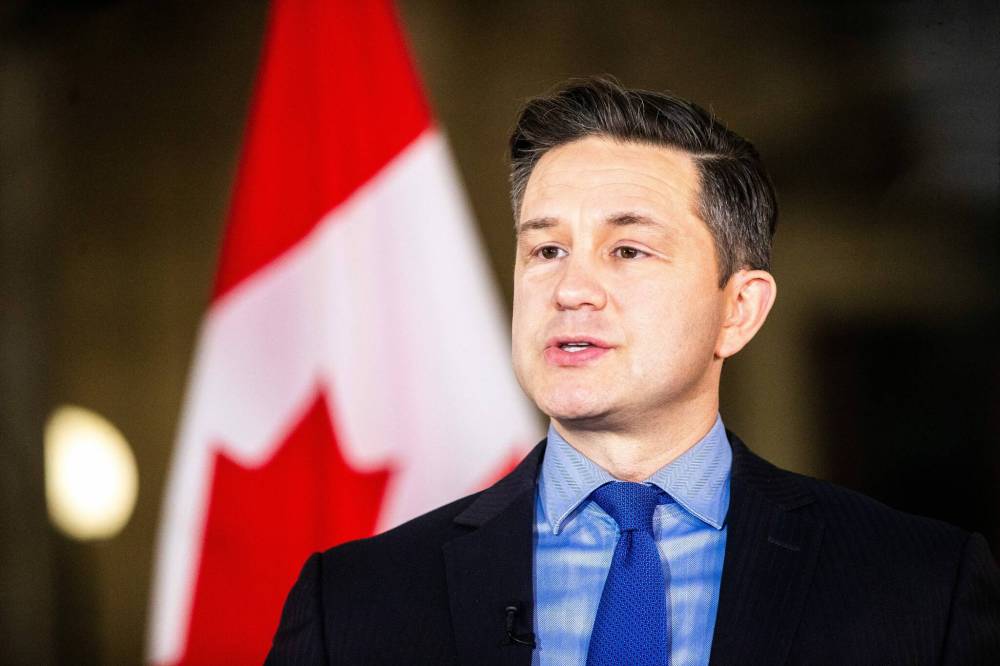It didn’t get much coverage — or any coverage that I could find — but federal Conservative Leader Pierre Poilievre’s statement this week recognizing the 16th anniversary of Canada’s apology to former students of residential schools was important on several fronts.
It was a crucial reminder that in 2008 Canada issued a formal apology to former students of residential schools for the profound, inter-generational harm this country caused them, their families and their communities. That apology was delivered on June 11, 2008, by former prime minister Stephen Harper.
“The treatment of children in Indian Residential Schools is a sad chapter in our history,” Harper said at the time. “For more than a century, Indian Residential Schools separated over 150,000 Aboriginal children from their families and communities.”

MIKAELA MACKENZIE / FREE PRESS FILES
Conservative Leader Pierre Poilievre recognized the 16th anniversary of Canada’s apology to former students of residential schools in a statement this week.
Canada’s objectives were clear, the prime minister said.
“Two primary objectives of the residential schools system were to remove and isolate children from the influence of their homes, families, traditions and cultures, and to assimilate them into the dominant culture,” he said. “These objectives were based on the assumption Aboriginal cultures and spiritual beliefs were inferior and unequal.”
Many Canadians are still not aware of that apology, or have forgotten about it. It’s important to highlight it on a regular basis, which Poilievre did this week. He did not mince words.
“For decades, the government used forced re-education as a weapon against Indigenous children to eradicate Indigenous cultures, languages and traditions,” the Conservative leader said. “Indigenous children were forcibly removed from the love and care of their families, only to be neglected and abused. Tragically, too many young children never made it home.”
It is critical to bring regular attention to the 2008 statement not only because it was was a historical apology, but also because it was an official acknowledgment by Canada of its genocidal policies against Indigenous people. That was an important starting point in Canada’s reconciliation journey.
Poilievre’s statement was important for another reason. There are still some Canadians who have been indoctrinated into believing that the horrors of residential schools and the impact they’ve had on Indigenous people have been exaggerated by “woke” actors like Prime Minister Justin Trudeau and other left-leaning influencers.
It wasn’t enough for them that it was a Conservative prime minister (and a fairly right-leaning one), who issued the apology 16 years ago. They continue to cling to the falsehoods that there were a lot good things about residential schools and that Canada was merely trying to give Indigenous kids a decent education.
The documented historical evidence and the testimony of thousands of residential school survivors contradicts those fabrications. Yet the denialism continues.
Perhaps hearing the truth again, this time from a Canadian politician who is arguably even more right-leaning than Harper, might change a few of those minds.
After all, it is the far-right in this country that is perpetuating the lies about residential schools. Maybe if they heard the facts from one of their own leaders they may rethink their position.
“The residential school system is a dark chapter of our nation’s history,” said Poilievre. “Two primary objectives of this system were to remove and isolate children from the influence of their homes, families, traditions, and cultures and to assimilate them into the dominant culture. These objectives were based on the false assumption that Indigenous cultures and spiritual beliefs were inferior and unequal. Today, we reaffirm that this policy of assimilation was wrong, has caused great harm, and has no place in our country.”
Poilievre’s statement mirrors Harper’s apology almost word for word in some areas. But he goes further by stating categorically that Canada’s objective was to “eradicate Indigenous cultures, languages and traditions.”
There is a mountain of evidence to support that assertion.
Leaders from Canada’s political right have an obligation to reinforce the facts about residential schools to counter the denialism that seems to spreading throughout the country. That denialism may be coming from a small minority of Canadians, but it is a vocal and destructive one. Their attempt to brainwash Canadians with lies is undermining Indigenous peoples ability to heal and is slowing the country’s reconciliation efforts.
Poilievre should be congratulated for his statement this week. Hopefully Canadians are listening.
tom.brodbeck@freepress.mb.ca

Tom Brodbeck
Columnist
Tom Brodbeck is a columnist with the Free Press and has over 30 years experience in print media. He joined the Free Press in 2019. Born and raised in Montreal, Tom graduated from the University of Manitoba in 1993 with a Bachelor of Arts degree in economics and commerce. Read more about Tom.
Tom provides commentary and analysis on political and related issues at the municipal, provincial and federal level. His columns are built on research and coverage of local events. The Free Press’s editing team reviews Tom’s columns before they are posted online or published in print – part of the Free Press’s tradition, since 1872, of producing reliable independent journalism. Read more about Free Press’s history and mandate, and learn how our newsroom operates.
Our newsroom depends on a growing audience of readers to power our journalism. If you are not a paid reader, please consider becoming a subscriber.
Our newsroom depends on its audience of readers to power our journalism. Thank you for your support.